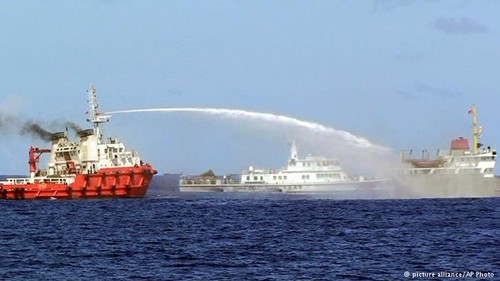(VOVworld) – Since China illegally placed its oil rig Haiyang 981 in Vietnam’s exclusive economic zone and continental shelf last month and used several ships including military vessels to ram non-military Vietnamese ships representing Vietnam’s sovereignty and jurisdiction, Vietnam has remained committed to a peaceful response. Vietnam’s consistent policy has won international support.
 |
A Chinese ship fires water cannon on Vietnamese law enforcement ships (photo: AP))
|
Vietnam’s marine security is part of regional security. Marine security includes both traditional and non-traditional security. Vietnam borders the sea on the east, south, and southwest and has a coastline of 3,260 km. Vietnam has internal waterways, territorial sea, contiguous waters, exclusive economic zone, and continental shelf. Vietnam has nearly 3,000 islands and archipelagoes including Hoang Sa and Truong Sa. Marine security plays an important role in Vietnamese economics, society, national defense, and environment.
Abiding by international law
Vietnam’s marine security policy was devised by the National Assembly and Government as part of the national defense strategy. At the 11th National Congress, the Communist Party of Vietnam identified strategic orientations to ensure security in Vietnam’s sea and islands to match the new situation and combine marine economy and security.
In June, 2012, the National Assembly approved the Law of the Sea which accords with the UN Charter and Convention on the Law of the Sea.
Vietnam has formed the Marine Police and Fishery Resources Surveillance to defend Vietnam’s legitimate rights and interests in the sea in line with the 1982 UN Convention on the Law of the Sea. Associate Professor Le Van Cuong, former Director of the Strategy Institute of the Ministry of Public Security, said: “All contents of Vietnam’s marine security policy are based on the UN Charter and the 1982 UN Convention on the Law of the Sea. Vietnam’s marine security policy accords with international agreements and Vietnam’s orientations of contributing to peace, stability, cooperation, and development in the East Sea. Vietnam’s policy has been acknowledged internationally. The US, Japan, Russia, the EU, and India support Vietnam’s marine security policy.”
While dealing with China’s illegal placement of oil rig Haiyang 981in Vietnam’s exclusive economic zone and continental shelf, Vietnam, with respect for international law, has expressed its goodwill and persisted in resolving differences through negotiations, talks, and other peaceful measures. Vietnam’s Defense Minister Phung Quang Thanh told the press on the sidelines of the 13th Shangri-la Dialogue in Singapore. “Vietnam’s orientation is to handle the problem through negotiation and peaceful measures based on international law, the UN Convention on the Law of the Sea, and the Declaration on the Conduct of Parties in the East Sea. We have practiced restraint and not used or threatened to use force. We have used fisheries resources surveillance, marine police and fishing ships and law enforcement force to protect national sovereignty. Vietnam’s stance has gained support internationally.”
Multi-lateral cooperation to resolve non-traditional security challenges in the East Sea
Vietnam has complied with international law to handle non-traditional security challenges. Vietnam has promoted its internal strength while expanding international relations with respect for each country’s independence, sovereignty, unity, and territorial integrity and not interfering in each other’s internal affairs. Associate Professor Le Van Cuong said: “Vietnam’s marine security is associated with international security, particularly that of ASEAN. The Law of the Sea came into force in 2012 when ASEAN countries were working to form an economic, cultural, and security community. The Law of the Sea and the implementation of the marine security policy have contributed to the establishment of the ASEAN security community. At the ASEAN+1, ASEAN+3, East Asia security, and APEC forums, Vietnam presented its Law of the Sea and won international praise.”
Vietnam has enhanced research and forecast the impacts of non-traditional marine challenges including climate change, cross-border crimes, and terrorism. Vietnam has built marine socio-economic development plans while ensuring resilient natural exploitation.
Vietnam’s marine policy, which respects international law and seeks to resolve disputes through peaceful negotiations without using or threatening to use force, has contributed to peace, stability, and cooperation in the East Sea and throughout the Asia-Pacific region.